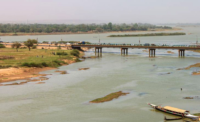The World Bank has barred a unit of Brazilian construction giant Odebrecht S.A., for three years from bank-financed projects, citing alleged fraud on a flood control and wastewater treatment project in Colombia.
The bank announced on Jan. 29 that it and Odebrecht had reached a settlement that includes the debarment of the parent company’s Brazilian construction and engineering subsidiary Construtora Norberto Odebrecht S.A., alleging that it took part in “fraudulent and collusive practices” related to the $487-million Rio Bogota environmental restoration and flood control project.
Odebrecht is a major international construction firm. ENR’s 2018 Top Global Contractors list shows Odebrecht Engenharia E Construcao ranking No. 98, with 2017 worldwide revenue of $3.35 billion.
In the settlement, Odebrecht “acknowledges responsibility for the underlying sanctionable practices and agrees to meet specified corporate compliance conditions” to be released from the debarment, according to the bank.
In statement emailed to ENR on Jan. 30, Odebrecht says that its settlement with the World Bank is similar to agreements the company has signed with entities in Brazil and other countries. They include settlements with the U.S., Switzerland, Dominican Republic, Panama, Ecuador and Guatemala.
Odebrecht adds that it “is still in negotiations with other countries.”
The company also says that it has committed to continue the “improvement process” of a compliance program that it has implemented in the past two years, in accord with the World Bank Integrity Compliance Guidelines.
The World Bank said that Odebrecht failed to disclose fees it paid to “commercial agents” in prequalification and bidding stages for the Colombian project. It added, “These agents assisted the company in obtaining confidential information.”
The bank added that with one of those agents’ help, the company “sought to improperly influence the tendering package that was part of the project, engaging in collusive practices prohibited by the World Bank procurement guidelines.”
ENR requested a copy of the settlement but a bank spokesperson said that the document is confidential.
The three-year term of the debarment represents a reduction of the possible sanction period, “in light of the company’s cooperation and voluntary remedial actions,” the World Bank says.
To be released from the debarment, the company has pledged to develop an “integrity compliance program” and continue to cooperate with the bank.
According to the World Bank, its debarment of Odebrecht “qualifies for cross-debarment with other multilateral development banks.”
Colombian project
According to a World Bank report, the Colombian project has a total estimated cost of $487 million. The bank’s share is a $250-million loan, which it approved in December 2010.
The project has four elements: upgrading and expanding a wastewater treatment plant; flood control and environmental restoration along the Rio Bogota; environmental and water studies; and project management and administration.
According to a Dec. 19, 2018, World Bank document, the flood control component is finished, but the contract for the largest item, the wastewater treatment plant, didn’t begin until April 2017. It was at 40% completion as of last Nov. 30, which the bank said was “ahead of schedule.” A bank update gives the current targeted completion date for the treatment plant as September 2021.
In December 2016—in what U.S. officials said was then the largest global foreign bribery settlement ever—the U.S. Dept. of Justice announced that Odebrecht S.A. and petrochemical company Braskem S.A had pleaded guilty and agreed to pay a minimum of $3.5 billion to settle allegations by the U.S., Brazil and Switzerland of paying “hundreds of millions of dollars” in bribes to government officials in various countries.
Of the total penalties, Odebrecht’s share was between $2.6 billion and $4.5 billion, DOJ said. Braskem was “effectively controlled” by Odebrecht, according to DOJ.



Post a comment to this article
Report Abusive Comment